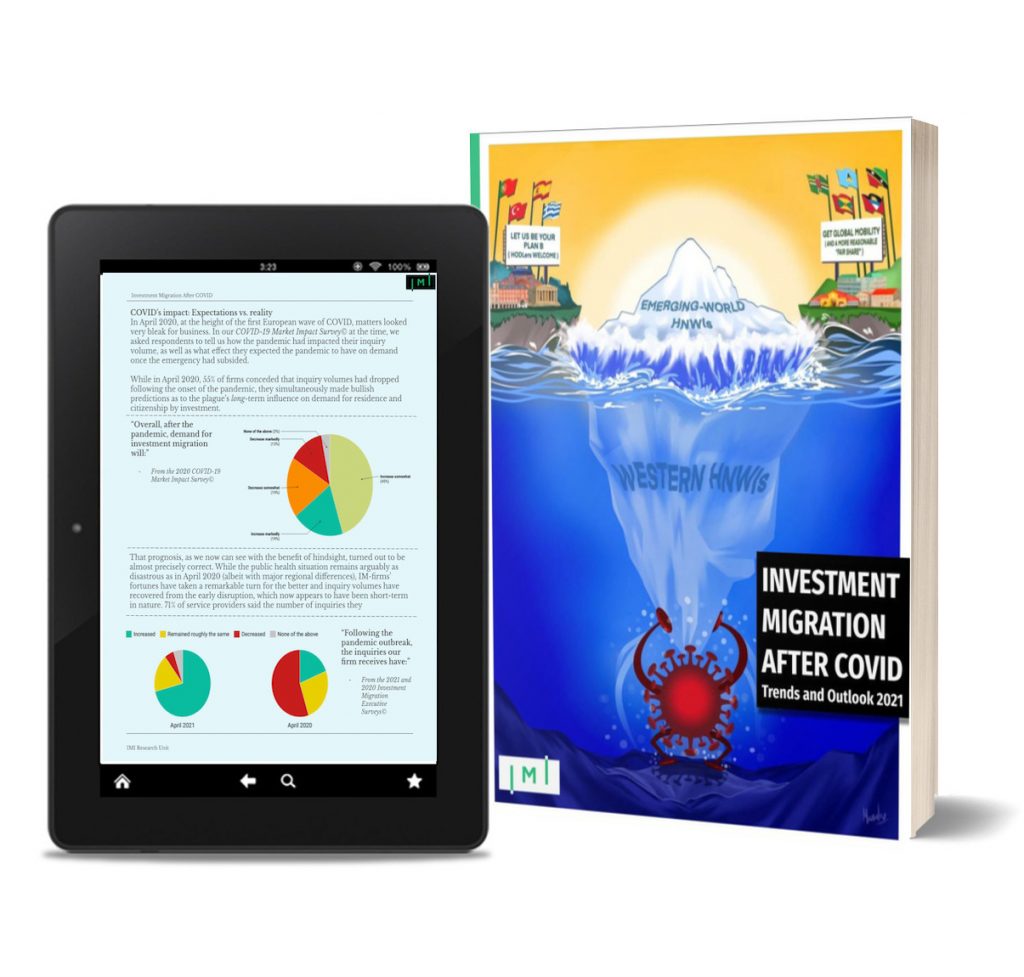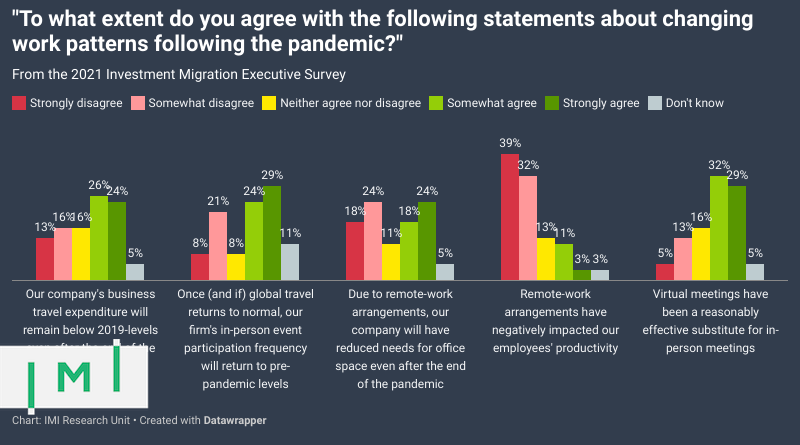Remote-Work Adaptations Likely to Outlast Pandemic Say Industry Executives
By and large, as the pandemic compelled companies globally to become more flexible in the way they work, investment migration businesses took the challenges in stride and have been able to adapt without undue disruptions to productivity. Many of these adaptations will become permanent,
Only 14% of respondents in this year’s Investment Migration Executive Survey indicated work-from-home arrangements had negatively impacted employee productivity, while fully four in ten strongly disagreed that output had suffered because of such distancing measures.
Widespread disgruntlement with Zoom-calls early in the pandemic notwithstanding, IM professionals appear to have grown accustomed to them after long periods away from the office; only a third of respondents disagreed that they had been a “reasonable substitute for in-person meetings.”
Opinions among IM executives, however, were more split regarding what happens to the new work patterns once the pandemic is in the rear-view mirror. Among those who had expectations one way or the other, half foresaw that such remote-work arrangements would permanently reduce their need for office space. In contrast, the other half predicted the opposite, indicating they consider an office presence an advantage for reasons unrelated to worker productivity.
A slim majority (53%) of respondents believed their firms would revert to pre-pandemic levels of live event participation once and if international travel returns to what in 2019 was considered normal. 29% signaled that new, virtual conference habits would allow them to reduce their spending on in-person event participation beyond the near-term, an observation that should concern event organizers.
50% of respondents expected business travel expenditure overall not to return to pre-pandemic levels even after the end of the crisis, while less than a third expressed confidence they’d spend as much time on the road as before once they are able to.
In the Investment Migration After COVID report, you can see the complete results of the 2021 Investment Migration Executive Survey, get an overview of which programs have been the relative winners and losers of the pandemic year, and learn how dozens of the leading executives in the investment migration market believe the market has, and will, change as a consequence of COVID.

The report attempts to identify the most consequential transformations that have taken place in the investment migration market over the last year, to prognosticate as to which marks 2020 will leave on the market in the long run, and to outline how industry professionals can prosper in the new investment migration market.
Investment Migration After COVID - Trends and Outlook 2021
Investment Migration After COVID tells the story of what we expected to happen after the pandemic, compares that to what happened, and highlights what dozens of leading investment migration executives anticipate will change in the years ahead.
- Findings of the April 2021 Investment Migration Executive Survey©
- How pandemic-related government restrictions have affected the service deliverability;
- How the pandemic has affected demand;
- Which source markets are growing the fastest;
- How client's preferences have changed as a consequence of the pandemic,
- In which regions IM companies are planning to open new offices;
- Which programs have risen and fallen the most in popularity over the last year;
- Which programs were the best-sellers in the last year, and which are expected to be the best-sellers in the next year; and
- Which application processing units were the most efficient in 2020.
- How companies have adapted to new work habits necessitated by the pandemic, such as working remotely, reducing travel and in-person event attendance, and the degree to which such changes are likely to persist in the long term.
- A review of the April 2020 COVID Market Impact Survey©
- How IM executives expected the pandemic to impact demand compared to what actually happened;
- How demand has changed between April 2020 and April 2021; and
- What IM executives expected to happen with border restrictions compared to what actually happened.
- An interview with Nestor Alfred of the Saint Lucia CIU
- How did the Unit change its policies to go from being a laggard to being the most efficient CIU, according to IM executives?
- The mega-trends driving the transformation of the IM market after COVID
- The West wakes up to investment migration;
- Crypto-millionaires: The new new rich;
- The race to digitize and remote-enable program processing;
- Beyond visa-free travel;
- How major investment migration programs performed in 2020
- The winners and losers of the pandemic.
- The biggest differences between the IM market before and after COVID, according to industry leaders
- Stefan Kraus, COO of Henley & Partners;
- Jean-François Harvey, Global Managing Director of Harvey Law Group;
- Eric G. Major, CEO of Latitude;
- Mohammed Asaria, Founder of Range Developments;
- Micha-Rose Emmett, CEO of CS Global Partners;
- Nicholas Stevens, Managing Director of NTL Trust;
- David Lesperance, Managing Partner of Lesperance & Associates;
- Paul Williams, CEO of La Vida Europe; and
- Sam Bayat, Founder of Bayat Legal Services.
IMI Club Pro Members:
FREE
IMI Club Members:
FREE
Christian Henrik Nesheim is the founder and editor of Investment Migration Insider, the #1 magazine - online or offline - for residency and citizenship by investment. He is an internationally recognized expert, speaker, documentary producer, and writer on the subject of investment migration, whose work is cited in the Economist, Bloomberg, Fortune, Forbes, Newsweek, and Business Insider. Norwegian by birth, Christian has spent the last 16 years in the United States, China, Spain, and Portugal.



